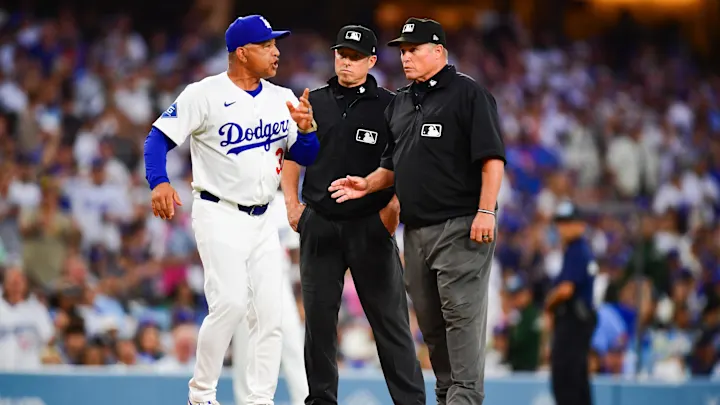Dave Roberts’ Ejection After Shohei Ohtani Was Hit: A Deep Dive into the Dodgers Manager’s Fiery Reaction and Its Implications
The world of baseball is no stranger to heated moments and intense rivalries, but when Dodgers manager Dave Roberts got ejected following the Padres’ controversial decision to hit Shohei Ohtani with a pitch, it sparked a firestorm of discussion among fans, analysts, and players alike. This incident is more than just a simple moment of frustration; it reflects deeper layers of baseball culture, player protection, strategic gameplay, and the emotional intensity that defines Major League Baseball (MLB). Let’s unpack the situation in detail, examine the reasons behind Roberts’ reaction, and consider the broader implications for the Dodgers, the Padres, and the game itself.
To start, it’s important to understand the context. Shohei Ohtani, the Los Angeles Angels’ superstar who is arguably the most unique player in the history of baseball, is a dual-threat as both an elite pitcher and a powerful hitter. His presence on the field commands immense respect and attention. When a player of Ohtani’s caliber gets hit by a pitch, it often raises eyebrows because it’s rarely accidental — pitchers usually avoid risking injury to top talent unless it’s strategic or retaliatory.
In the Dodgers-Padres game, tensions were high. Rivalries between these teams have been escalating in recent seasons, with both clubs boasting talented rosters and competing fiercely for playoff positioning. When the Padres pitcher threw inside and hit Ohtani, it was perceived by many as an aggressive move — one that challenged not just Ohtani’s safety, but also the competitive spirit of the game. The Dodgers, known for their discipline and focus, were understandably upset by the incident.
Dave Roberts’ ejection stemmed from his immediate reaction to the pitch. As a manager, Roberts is responsible for protecting his players, maintaining team morale, and managing the emotional undercurrents on the field. His decision to confront the umpires, likely to advocate for Ohtani and to protest what he saw as an intentional and dangerous act, was a natural extension of his leadership role. However, it also crossed a line in the eyes of the officials, who enforce rules designed to keep order and prevent escalation.
The ejection itself is a testament to Roberts’ fiery passion and willingness to stand up for what he believes is right. It shows that he’s not afraid to challenge authority when it comes to the safety and dignity of the players he respects. This moment of defiance can inspire the Dodgers, reinforcing a culture of resilience and solidarity. Yet, it also places the team at a tactical disadvantage, as losing a manager during a game can disrupt decision-making and momentum.
Beyond Roberts’ personal reaction, this incident shines a light on the ongoing debate about hitting batters in MLB. While hitting a batter is a part of the game’s history, often used to send messages or deter aggressive base running, it’s increasingly viewed through the lens of player safety. With the game evolving, and with pitchers throwing harder and hitters running faster, the risk of injury is greater than ever. When pitchers intentionally hit batters, it raises questions about sportsmanship and the ethical boundaries of competition.
The Padres’ role in this incident also warrants scrutiny. Was the pitch a calculated risk to unsettle Ohtani and gain a psychological edge? Or was it a misguided attempt to send a message to the Dodgers? Either way, it escalated the tension and set the stage for a charged atmosphere in the clubhouse and on the field. How the Padres handle the aftermath — whether through apologies, statements, or internal discipline — will influence how their fan base and the wider baseball community view the integrity of their team.
From a strategic standpoint, the timing of the hit pitch also plays a critical role. If the Padres’ pitcher targeted Ohtani at a crucial moment in the game, it could be interpreted as an attempt to disrupt the Angels’ offensive rhythm and assert dominance. Such tactics are risky because they can backfire — not only by energizing the opposing team but also by drawing penalties or ejections that hurt the offending team.
Dave Roberts’ ejection also underscores the intense pressure managers face in today’s MLB environment. Managers are expected to be calm strategists, emotional leaders, and skilled negotiators all at once. Balancing these roles amid high-stakes competition and passionate fanbases is no easy task. Roberts’ decision to engage in a heated exchange with the umpires, knowing it could lead to ejection, shows his commitment to advocating for fair play and player safety, even at personal cost.
This event might also influence how umpires handle future incidents involving high-profile players like Ohtani. Officials must walk a fine line between maintaining control of the game and recognizing the emotional intensity that fuels player and manager reactions. Their decisions to eject managers or players can have lasting consequences on the game’s flow and the season’s narrative.
Looking ahead, the fallout from this incident could ripple through the rest of the season. It might affect the Dodgers’ strategy, with Roberts potentially facing increased scrutiny or pressure to maintain composure. It could also impact the Padres’ reputation, with other teams viewing them as willing to cross boundaries to gain an advantage. Furthermore, it might spark renewed conversations about MLB’s policies on hit-by-pitches and player safety protocols.
In summary, Dave Roberts’ ejection after the Padres hit Shohei Ohtani is a powerful moment that encapsulates the emotional and competitive complexity of baseball. It reflects the protective instincts of a manager, the high stakes of team rivalries, and the ongoing challenge of balancing aggressive gameplay with player safety. While Roberts’ fiery response cost the Dodgers in the short term, it also sent a clear message that certain lines won’t be crossed without consequence. This incident will be remembered not just for the ejection, but for what it reveals about the passion and intensity that make baseball such a beloved and unpredictable sport.



